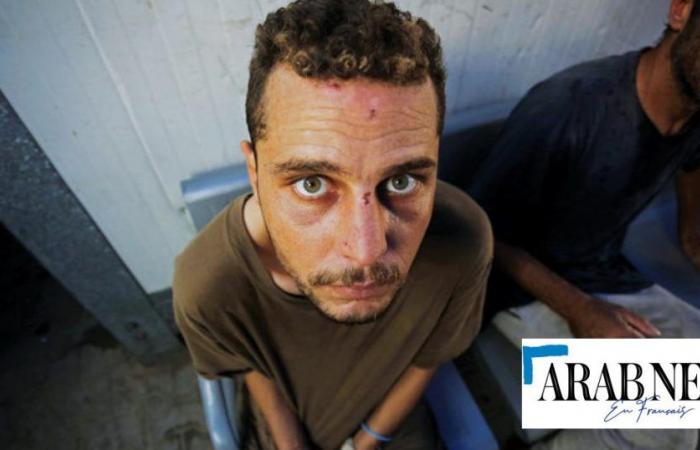LONDON: Last week, a disturbing video of a Palestinian, Badr Dahlan, 29, was shared on social media.
Wide-eyed and rocking back and forth as he spoke, Dahlan appeared in shock as he answered questions at Shuhada Al-Aqsa Hospital in Deir Al-Balah, Gaza Strip , shortly after his release from prison by Israel.
Dahlan, described by those who knew him as “a socially active and beloved young man”, seemed completely transformed by the month he had spent in Israeli custody since being arrested in Khan Younis.
He described a pattern of beatings, torture and abuse that has become familiar to NGOs monitoring the dramatic increase in the number of Palestinians incarcerated without charge or trial since the conflict in Gaza began last October.
While the world’s attention remains focused on the last hostages taken by Hamas on October 7, the fate of the “other hostages” – thousands of innocent Palestinian adults and children seized and detained by Israel without charge – is largely ignored.
“There are currently around 9,200 prisoners in total in the West Bank and the occupied territories,” said Jenna Abu Hsana, head of international advocacy at the Palestinian NGO Addameer (Prisoner Support and Human Rights Association). man), based in Ramallah.
“We think about 3,200 of them are administrative detainees.
Administrative detention “is essentially a tool used by the occupation to indefinitely detain Palestinians for an extended period of time” in prisons run by the Israeli Prison Service,” she said.
Detainees are charged and “tried” by military courts, but the process circumvents all norms of internationally recognized legal procedure.
“There is no real charge because no evidence is presented against the detainee,” Abu Hsana said. “The so-called evidence is kept in a secret file to which the detainee and his lawyer have no access.
Incarceration can last up to six months and may be extended by six months at the discretion of the military.
Originally, the cases of those detained under this law were to be subject to judicial review within 14 days, but in December this deadline was increased to 75 days. At the same time, the length of time a prisoner can be denied an interview with a lawyer was increased from 10 to 75 days or, with court approval, up to 180 days.
According to B’Tselem, the Israeli information center for human rights in the occupied territories, this is an unjust situation that “leaves detainees defenseless – facing unknown allegations with no way to address them.” refute, without knowing when they will be released and without having been charged, tried or sentenced.
Israel “regularly uses administrative detention and has, over the years, placed thousands of Palestinians behind bars for periods ranging from months to years, without charging them, without telling them what they are accused of, and without disclosing the alleged evidence to them or their lawyers.”
The situation in Gaza is slightly different, as those detained there since October have been arrested and held incommunicado in military camps under Israel’s law on the incarceration of illegal combatants, which was introduced in 2002.
But the effect is the same as for people detained under administrative detention. “Detainees can be held in these military camps for long periods of time, without charge or evidence,” Mr. Abu Hsana said.
Before October 7, Israel held approximately 5,000 Palestinians from the West Bank and the occupied territories in its prisons, approximately 1,000 of whom were under administrative detention.
Since October 7, however, “the numbers have increased,” Abu Hsana said. “There are currently more than 9,200 detainees in prisons, including 3,200 in administrative detention.
However, NGOs struggle to determine exactly how many people have been kidnapped in Gaza.
“We do not have precise figures because the occupation refuses to release information, but we are told that there are currently between 3,000 and 5,000 detainees.
Most of them are held in one of two military sites – Camp Anatot, near Jerusalem, and Sde Teman, near Beersheba, in the northern Negev.
Access to families and even lawyers is denied throughout the duration of detention in these camps. But as some prisoners have been released in recent months, shocking details have begun to emerge.
“For Gaza detainees, it is particularly difficult because they are handcuffed and blindfolded throughout their detention, from the moment of their arrest until their release, and the plastic ties used are very tight and caused many serious injuries,” Abu Hsana said.
In April, the Israeli newspaper Haaretz obtained a copy of a letter sent to Israel’s attorney general and the defense and health ministers by a distressed Israeli doctor in Sde Teman.
“Just this week,” the doctor writes, “two prisoners had their legs amputated following injuries caused by handcuffs, which is unfortunately a common occurrence.
He added: “I have been faced with serious ethical dilemmas. Furthermore, I am writing to warn you that the operation of the facilities does not comply with a single section of the Unlawful Combatants Incarceration Act that deals with health.”
He added that none of the detainees were receiving proper medical care.
All this, he concludes, “makes us all – the medical teams and you, the officials of the health and defense ministries – complicit in the violation of Israeli law, and perhaps worse for me as a doctor , of violating my fundamental commitment to patients everywhere, as I swore to when I graduated 20 years ago.”
UNRWA, the United Nations Relief and Works Agency for Palestine Refugees in the Near East, recently released a scathing report condemning the treatment of Palestinians who were detained without charge or trial and then released.
The report is based on information obtained through UNRWA’s role in coordinating humanitarian assistance at the Karem Abu Salem crossing between Gaza and Israel, where Israeli security forces have been regularly releasing detainees since the start of the month of November 2023.
As of April 4, UNRWA had documented the release of 1,506 detainees, including 43 children and 84 women. Detainees reported being sent for interrogation several times and suffering widespread mistreatment.
They were notably “beaten and lying on a thin mattress placed on rubble for hours, without food, without water and without access to a toilet, with their legs and hands tied with plastic ties”.
Several detainees, according to UNRWA, “reported being forced into cages and attacked by dogs. Some released detainees, including a child, had dog bites on their bodies.”
Other reported methods of ill-treatment include “beating, threats of physical harm, insults and humiliation such as behaving like animals or being urinated on, the use of loud music and noise, deprivation of water, food, sleep and toilets, denial of the right to pray and prolonged use of securely locked handcuffs causing open wounds and chafing injuries.”
In a statement provided to the BBC in response to UNRWA’s findings, the Israel Defense Forces said: “The mistreatment of detainees during their period of detention or interrogation violates the values of the Israel Defense Forces (IDF). ) and are therefore absolutely prohibited.
They rejected specific allegations, including denial of access to water, medical care and bedding. The IDF also said the sexual abuse allegations were “another cynical attempt to create a false equivalence with Hamas’ systematic use of rape as a weapon of war.”
Israeli peace activists demonstrated outside the camp, holding banners reading “Sde Teman torture camp” and “Israel makes people disappear.” In an apparent attempt to ease growing unease over the treatment of detainees, Israel in early June invited The New York Times to “briefly view part” of the facility.
If officials were hoping for a stamp of approval, they were disappointed.
On June 6, the newspaper described “the scene that took place one afternoon in late May in a military hangar inside Sde Teman.” In barbed wire cages, the newspaper reported, “the men sat in rows, handcuffed and blindfolded […] they were forbidden to speak above a whisper, to get up or to sleep, unless authorized.”
All were “cut off from the outside world, prevented for weeks from contacting lawyers or relatives”.
In late May, the NYT learned that approximately 4,000 Gazan detainees had spent up to three months in Sde Teman limbo, including “several dozen” people captured during the Hamas-led attack on October 7.
After being interrogated, “around 70% of the detainees were sent to purpose-built prisons for investigation and prosecution.”
“The rest, at least 1,200 people, were considered civilians and returned to Gaza, without charge, apology or compensation.
On May 23, a group of Israeli human rights organizations filed a petition with the Supreme Court demanding the closure of the camp. The government agreed to scale back its activities and the court ordered the state to submit a report on living conditions in the camp by June 30.
But protesters and NGOs say the Sde Teman scandal is just the tip of the iceberg.
“Dozens of testimonies document widespread torture and ill-treatment of Palestinian detainees, as well as numerous cases of death in Israeli prisons and military camps, in blatant violation of the law’s absolute prohibition on torture. international,” said Miriam Azem, communications and international advocacy associate at Adalah, the legal center for Arab minority rights in Israel.
“Thousands of Palestinians are placed in administrative detention without charge or trial, based on secret evidence, in deplorable conditions that endanger their lives.
“Hundreds of Palestinians in Gaza are being held incommunicado, without access to lawyers or family, without knowing their whereabouts, under a legal framework that allows for enforced disappearances, which constitutes a serious violation of international law.
“The urgency of the current situation demands immediate and resolute intervention from the international community. Inaction endangers the lives of Palestinians.”
This text is the translation of an article published on Arabnews.com






